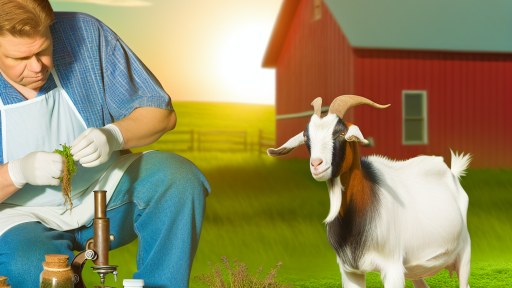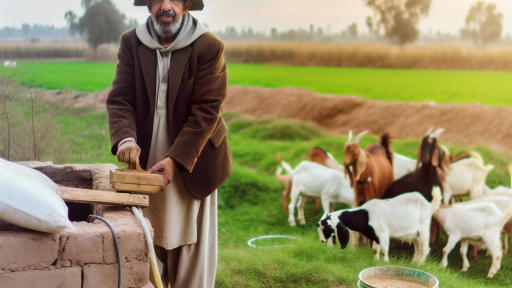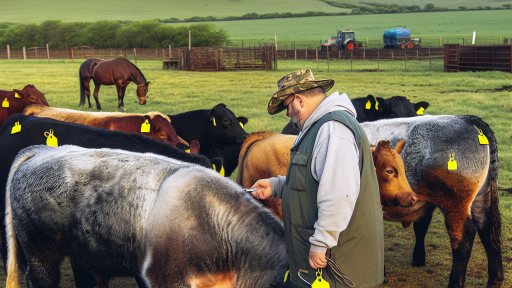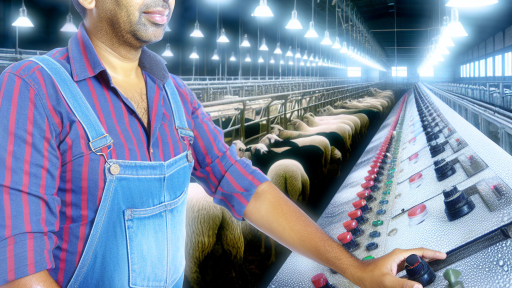Introduction to Exotic Livestock and Their Nutritional Needs
Exotic livestock presents unique challenges and opportunities in farming.
Understanding their nutritional needs is crucial for successful management.
Different species have varying dietary requirements based on their biology.
With the right nutrition, these animals can thrive and produce effectively.
Many exotic livestock types include llamas, ostriches, and miniature pigs.
Each species has specific nutritional needs relevant to their natural habitat.
For instance, llamas require high-quality forage as their primary food source.
Ostriches, on the other hand, need a balanced diet rich in protein and minerals.
Additionally, miniature pigs need specialized diets to prevent obesity.
Farmers must consider these specific needs for optimal health and productivity.
Moreover, nutrition influences growth rates, reproduction, and overall health.
Deficiencies in essential nutrients can lead to severe health issues.
Inadequate nutrition can negatively impact productivity in exotic livestock.
Therefore, understanding their dietary needs significantly benefits farmers.
Essential Nutrients for Exotic Livestock
Exotic livestock needs various essential nutrients for optimal health.
Transform Your Agribusiness
Unlock your farm's potential with expert advice tailored to your needs. Get actionable steps that drive real results.
Get StartedThese nutrients include proteins, carbohydrates, fats, vitamins, and minerals.
Proteins play a vital role in growth, development, and tissue repair.
Carbohydrates provide energy and support metabolic functions.
Fats offer an energy-dense food source and aid in nutrient absorption.
Vitamins and minerals are crucial for many biochemical processes.
These include immune function and bone development.
Feeding Strategies for Different Species
Diverse feeding strategies are necessary for different exotic livestock species.
For llamas, grazing on good-quality pasture is essential.
They benefit from a diet high in fiber to ensure proper digestion.
Ostriches require a balanced mix of grains, seeds, and greens.
It is important to provide supplements rich in calcium and phosphorus.
Miniature pigs need controlled diets to manage their weight effectively.
High-fiber diets and low-calorie feed prevent obesity-related health issues.
Regular monitoring of body condition is also essential.
Farmers should adjust diets based on specific needs throughout growth stages.
Key Nutritional Components for Exotic Livestock
Proteins
Proteins serve as the building blocks for growth in exotic livestock.
They play a vital role in muscle development and repair.
Livestock require a variety of protein sources for optimal health.
These sources may include plants, grains, and animal products.
High-quality proteins contain essential amino acids for bodily functions.
It is crucial to monitor the protein intake of exotic species.
Excessive protein can lead to health complications.
Farmers should implement a balanced diet to meet protein needs.
Carbohydrates
Carbohydrates act as a primary energy source for exotic livestock.
Showcase Your Farming Business
Publish your professional farming services profile on our blog for a one-time fee of $200 and reach a dedicated audience of farmers and agribusiness owners.
Publish Your ProfileThey help sustain daily activities and vital functions.
Different types of carbohydrates provide varying levels of energy.
For instance, simple sugars offer quick energy, while fibers support digestion.
Incorporating grains and forage helps meet carbohydrate requirements.
It is important to include high-fiber options to prevent digestive issues.
Farmers should adjust carbohydrate levels based on the species.
Ultimately, a balanced carbohydrate intake fosters overall health.
Fats
Fats play a crucial role in the nutritional needs of exotic livestock.
They serve as a concentrated energy source for animals.
Fats also assist in the absorption of fat-soluble vitamins.
Moreover, they support hormone production and cell structure.
Incorporating healthy fats into their diet is essential.
Sources of fat may include oils, seeds, and fish meals.
Farmers should monitor fat intake to prevent obesity in livestock.
A controlled amount of fat promotes vitality and well-being.
Comparative Analysis of Nutritional Requirements Among Different Species of Exotic Livestock
Understanding Nutritional Requirements
Each species of exotic livestock has unique nutritional needs.
These requirements depend on various factors, including age, breed, and environment.
Proper nutrition plays a critical role in their growth and productivity.
Addressing their specific dietary needs promotes overall health and well-being.
Key Nutritional Needs by Species
Different exotic livestock species have distinct dietary preferences.
Understanding these preferences helps farmers optimize their feeding strategies.
Ruminants
Ruminants like alpacas and wildebeests thrive on high-fiber diets.
They primarily consume grasses and browse materials.
Balanced mineral and vitamin supplementation is essential for ruminants.
Monogastrics
Monogastrics such as pigs and emus have different nutritional profiles.
They require a protein-rich diet for optimal growth rates.
Grains, legumes, and protein concentrates serve as primary feed sources.
Avians
Exotic birds, including parrots and pheasants, require varied diets.
Seed mixtures, fruits, and leafy greens provide essential nutrients.
Calcium-rich foods are crucial for egg-laying species.
Factors Influencing Nutritional Needs
Several factors influence the nutritional needs of exotic livestock.
These include physical activity, stage of life, and environmental conditions.
Seasonal changes may also alter dietary requirements.
Age and Growth Stage
Young animals generally require more protein for growth.
As they mature, their nutritional needs will shift.
Monitoring these changes is key for optimal feeding strategies.
Environmental Conditions
Hot or cold environments can affect feed intake and digestion.
Animals may need additional nutrients to cope with extreme weather.
Providing adequate water and shade is essential for hydration.
Uncover the Details: Essential Guide to Sustainable Fish Farming Practices
Showcase Your Farming Business
Publish your professional farming services profile on our blog for a one-time fee of $200 and reach a dedicated audience of farmers and agribusiness owners.
Publish Your ProfileFeeding Practices for Common Exotic Livestock
Nutritional Overview
Exotic livestock, such as alpacas and llamas, have unique nutritional needs.
These animals thrive on diets that mimic their natural habitats.
Understanding their dietary requirements ensures optimal health and productivity.
Forage and Fiber Requirements
Alpacas and llamas require high-fiber diets for proper digestion.
They predominantly eat grasses and hay, which provide necessary roughage.
Additionally, providing clean water at all times is essential.
Types of Forage
- Timothy hay
- Orchard grass hay
- Alfalfa hay (in moderation)
These types of forage support healthy digestive systems.
Supplementary Nutrition
While forages are essential, supplements can enhance their diets.
These include minerals, vitamins, and specially formulated pellets.
Calcium and phosphorus are two critical minerals for bone health.
Choosing Supplements
- Select a quality mineral mix.
- Consider age, weight, and activity level.
- Monitor body condition regularly.
Adjust supplements based on individual needs and veterinary advice.
Feeding Strategies
Implementing effective feeding strategies promotes optimal growth.
Regularly scheduled feeding times reinforce digestive health.
Moreover, observe animal behaviors around feeding to gauge satisfaction.
Batch Feeding
Batch feeding can prevent overconsumption and waste.
Collaboratively feeding in groups helps reduce competition.
Maintain a clean feeding area to avoid contamination.
Monitoring Health and Diet
Regular health check-ups are crucial for exotic livestock.
Veterinarians can provide personalized nutritional recommendations.
Monitoring weight and body condition score assists in adjusting diets.
Indicators of Good Health
- Shiny and healthy coat
- Active social behavior with peers
- Normal gastrointestinal function
Any sudden changes in behavior or health may require immediate attention.
Seasonal Feeding Adjustments
Dietary needs can change with the seasons.
In winter, animals may need additional calories to maintain body warmth.
Conversely, spring may require less high-energy food as grazing improves.
Adapting to Seasonal Changes
Monitor forage availability and adjust feed accordingly.
Transition gradually to prevent digestive upset.
Always consider the local climate when planning diets.
See Related Content: Lighting Solutions For Livestock Housing
Supplements and Additives: Enhancing Diets for Optimal Health in Exotic Livestock
Importance of Supplements
Supplements provide essential nutrients missing from basic diets.
They support the overall health of exotic livestock in various environments.
Optimal health enhances growth, reproduction, and disease resistance.
Types of Supplements
Mineral supplements are crucial for many exotic species.
These minerals prevent deficiencies and support metabolic functions.
Vitamins also play a vital role in maintaining health and vitality.
Both organic and inorganic additives can improve diet quality.
Protein Sources
Protein is essential for muscle development and overall health.
Animal-based proteins often offer superior amino acid profiles.
Plant-based proteins are also viable and can be more sustainable.
Supplements such as fish meal or soy can be beneficial additions.
Fiber Additives
Fiber supports digestive health in exotic livestock.
Showcase Your Farming Business
Publish your professional farming services profile on our blog for a one-time fee of $200 and reach a dedicated audience of farmers and agribusiness owners.
Publish Your ProfileAdding fiber sources improves gut health and nutrient absorption.
Common fiber sources include alfalfa, beet pulp, and hay.
These sources help maintain a healthy weight and prevent obesity.
Promoting Gut Health
Probiotics and prebiotics enhance gut microbial balance.
Healthy gut flora improves digestion and nutrient absorption.
These additives may reduce the risk of gastrointestinal diseases.
Natural Enhancers
Natural herbal additives can also improve livestock health.
These include garlic, turmeric, and ginger for their antibacterial properties.
Such ingredients may enhance immunity and overall wellness.
Proper Dosage and Administration
Correct dosage is crucial for the effectiveness of supplements.
Consulting with a veterinarian ensures proper use and safety.
Administering supplements in a balanced diet leads to optimal results.
Monitoring Health and Performance
Regular health checks help gauge the effectiveness of supplements.
Monitoring performance metrics informs necessary dietary adjustments.
Adjusting supplement types or amounts can enhance livestock welfare.
Explore Further: Implementing Genomic Selection in Livestock
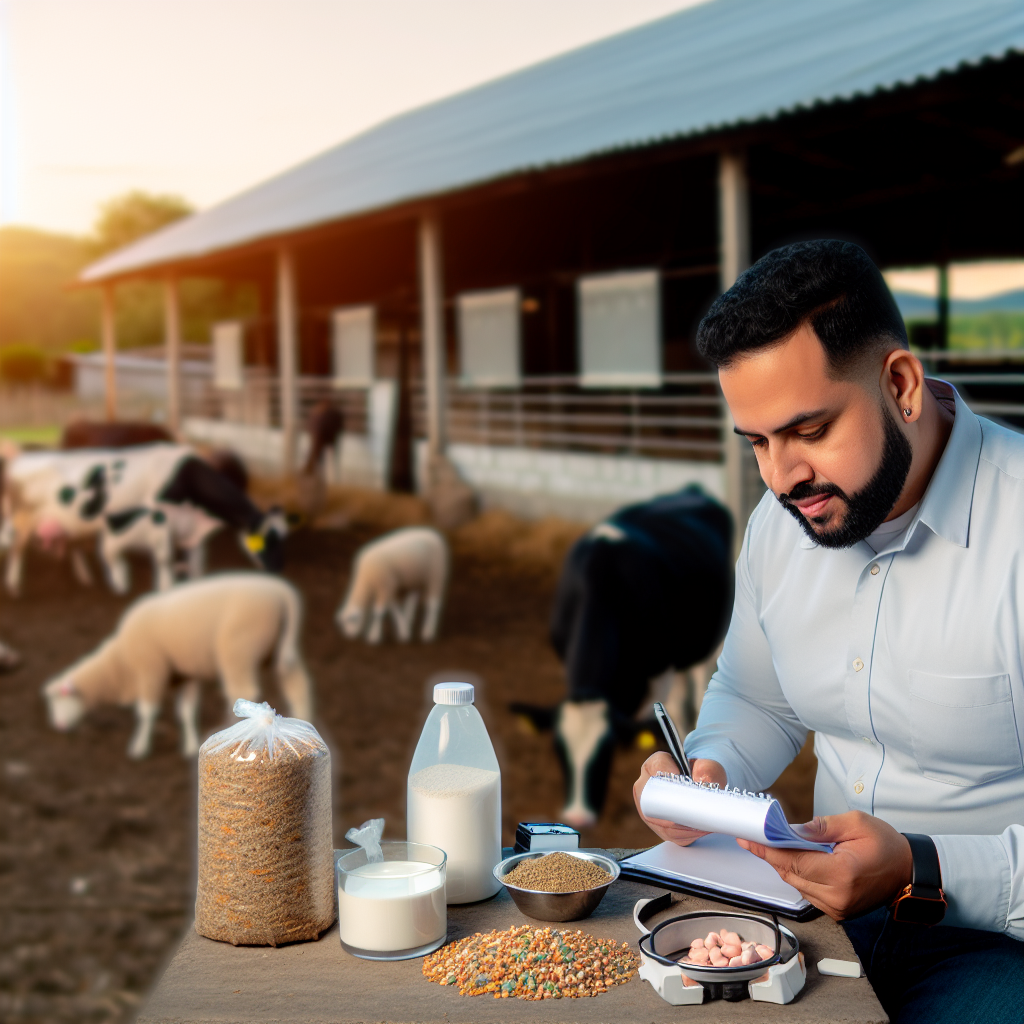
Seasonal Dietary Adjustments: How to Modify Nutrition for Climate Variations
Understanding the Role of Climate on Nutrition
Climate significantly influences the nutritional needs of exotic livestock.
Temperature changes impact feed availability and quality.
For instance, warmer seasons may reduce forage quality.
This can lead to nutrient deficiencies in grazing animals.
Conversely, colder months might necessitate higher energy diets.
Adaptations for Extreme Temperatures
Farmers must adjust diets based on seasonal temperature extremes.
In hot weather, provide more water and electrolytes.
Additionally, reduce protein levels but increase fiber content.
This helps prevent heat stress and improves digestion.
In frigid conditions, increase energy-rich feeds.
Consider adding fats to boost calorie intake efficiently.
Seasonal Forage Management
Managing forage availability is crucial throughout the seasons.
During spring and summer, legumes and grasses thrive.
In fall and winter, consider stored feeds or supplements.
Silage and hay can provide essential nutrients when fresh forage is scarce.
Monitor pasture conditions regularly to optimize grazing duration.
Nutrient Supplementation Techniques
Supplementing diets ensures exotic livestock meet their nutritional needs.
Mineral and vitamin blocks are effective during seasonal transitions.
Moreover, consider using grain mixes during colder months.
These enhance energy while maintaining overall health.
Be mindful of changes in feed formulations as seasons change.
Monitoring Livestock Health
Regular health checks are essential to assess dietary impacts.
Observe body condition scores consistently throughout the year.
Adjust feeding strategies based on any health indicators.
Showcase Your Farming Business
Publish your professional farming services profile on our blog for a one-time fee of $200 and reach a dedicated audience of farmers and agribusiness owners.
Publish Your ProfileHealthy livestock require fewer adjustments to their nutrition.
This promotes optimal growth and reproductive performance.
Delve into the Subject: Breeding Techniques for Exotic Livestock
Challenges in Sourcing and Providing Nutritional Feeds for Exotic Species
Diverse Nutritional Requirements
Exotic livestock species exhibit highly varied nutritional needs.
This variation complicates the formulation of adequate diets.
For instance, species like kangaroos require high fiber diets.
Conversely, crocodiles need a protein-rich intake for optimal growth.
Availability of Quality Ingredients
Sourcing quality feed ingredients presents significant hurdles.
Many local suppliers do not stock the specialized ingredients required.
Exotic species often need uncommon plants, minerals, and supplements.
Consequently, producers may resort to importing certain components.
Cost Considerations
Importing feed ingredients can strain financial resources.
Exotic feed can be significantly more expensive than conventional options.
Farmers must balance the cost against the health needs of their livestock.
Research and Knowledge Gaps
Many farmers lack access to comprehensive dietary guidelines.
Existing research on exotic livestock nutrition is sometimes limited.
As a result, farmers often experiment with diets without guidance.
This trial-and-error approach can lead to nutritional deficiencies.
Regulatory Challenges
Regulations surrounding feed ingredients can vary widely.
Farmers may face restrictions on importing certain supplements.
Compliance with local and national regulations is essential.
Failure to adhere can result in hefty fines or feed recalls.
Health Monitoring and Adjustments
Regular health monitoring is crucial for wild and exotic livestock.
Farmers should be prepared to adjust diets based on health changes.
Vet consultations can help tailor nutritional plans effectively.
Ultimately, this proactive approach enhances livestock welfare.
Importance of Custom Diets for the Well-being of Exotic Livestock
Understanding Nutritional Needs
Exotic livestock possess unique nutritional requirements.
These requirements differ significantly from traditional farm animals.
A proper understanding helps ensure they thrive.
Each species has specific dietary needs that must be met.
For instance, herbivorous species need high-fiber diets.
Conversely, carnivorous animals require protein-rich foods.
Benefits of Custom Diets
Custom diets enhance the health of exotic livestock.
They help prevent nutritional deficiencies.
Additionally, tailored diets boost vitality and longevity.
Healthy animals contribute positively to farming operations.
Custom nutrition also supports better reproductive performance.
Creating the Right Diet
Creating the right diet requires knowledge and planning.
Farmers must assess individual dietary needs.
Collaboration with veterinarians and nutritionists is crucial.
Showcase Your Farming Business
Publish your professional farming services profile on our blog for a one-time fee of $200 and reach a dedicated audience of farmers and agribusiness owners.
Publish Your ProfileFeeding trials can provide valuable insights.
Monitoring animal health regularly ensures diets are effective.
Customized Nutrition for Sustainable Farming
Custom diets are vital for exotic livestock.
They play an essential role in ensuring overall health.
Farmers should prioritize the nutritional needs of these animals.
By doing so, they enhance animal welfare and productivity.
Ultimately, this leads to a more sustainable farming practice.
Additional Resources
Animal Welfare Act | National Agricultural Library
Animal Science (ANSC) | University of Connecticut Academic Catalog

